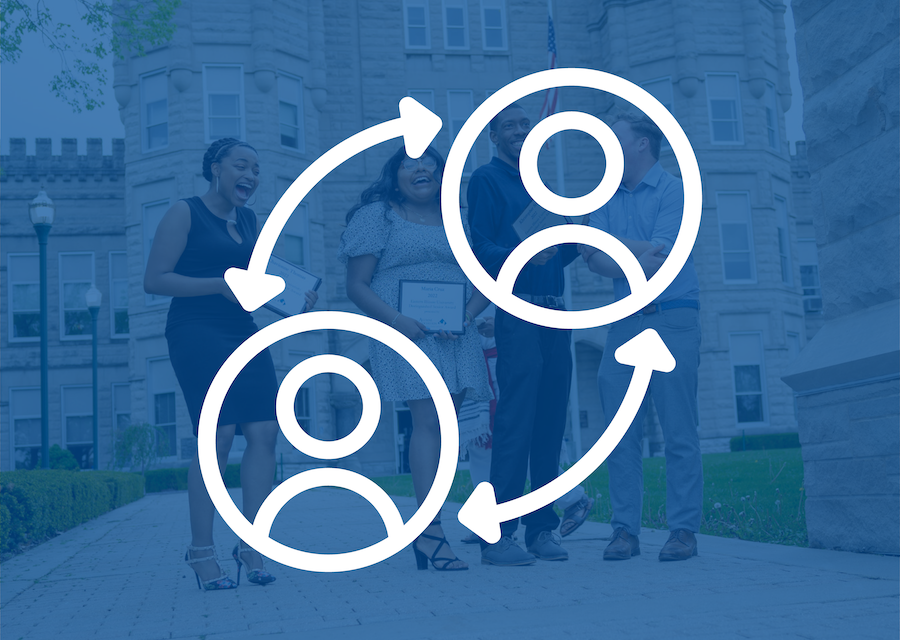EIU'S Strategic plan: PLAN 2028
Welcome to Strategic Planning at EIU! We want to make EIU’s next cycle of Strategic Planning as inclusive and meaningful as possible for all University stakeholders — students, faculty, staff, and community partners alike.
Plan 2028 TrackingOn June 23, 2023 the Board of Trustees endorsed EIU’s new strategic plan, Plan 2028, at its most recent meeting. As you will see, Plan 2028 aligns with the IBHE’s “A Thriving Illinois” framework and advances EIU’s mission, the region, and state by focusing on four interconnected themes:

Achieve: Achieve Success for All Learners
ACHIEVE priorities align and invest in policies, practices, and resources that ensure every learner at EIU thrives. The ACHIEVE activities comprise a broad collection of strategic investments and student success supports. For Eastern Illinois University, ACHIEVE focuses on retention, learning outcomes, creating and maintaining active learning environments, adequate financial assistance, degree completion, career preparedness, and student wellness. ACHIEVE priorities leverage EIU’s commitment to student success using a holistic array of academic and other organizational supports.

Engage: Engage the Community, Region, State, & World
ENGAGE priorities are intended to build bridges between and amongst its internal and external stakeholders to expand and enhance the everyday worlds of EIU’s students, faculty, staff, alumni, and communities at all scales. ENGAGE seeks to build collaborative opportunities for economic development, regional prosperity, and personal growth. ENGAGE deepens EIU’s connection and commitment to the region, State, and world.

Create: Create a 21st Century Campus & Culture
CREATE priorities evidence a sustained commitment to all employees and students by cultivating belonging and creating a culture of care for all. CREATE accelerates efforts to innovate, invigorate, and reaffirm EIU’s unique institutional identity. Echoing the IBHE’s strategic plan, Plan 2028 advances EIU’s shared values of equal opportunity for all students, employees, and community members. CREATE activities focus on investing in employee and learner wellness, knowledge creation, creativity, and belonging.

Resource: Encourage Innovation, Diversify Revenue, & Grow Enrollments
RESOURCE priorities focus on overall institutional sustainability, staffing, and enhanced business practices. The theme of RESOURCE will ensure that EIU’s budgeting process, operations, and enrollment management efforts focus on sustained financial stability and invests in the strategic priorities of Plan 2028. This priority also ensures compliance with federal and State regulations, as well as financial benchmarks established by Eastern's regional accreditation body, the Higher Learning Commission.
Implementation
EIU is driven by its mission and vision, placing deliberate emphasis on fostering student success, bolstering the economy of the State of Illinois, and serving regional, state, and national stakeholders. Plan 2028, aligned with the Illinois Board of Higher Education's strategic plan, "A Thriving Illinois," is an extension and complement to it. The IBHE plan specifically focuses on harnessing the potential of higher education to promote sustainability, and economic growth.
Plan 2028 at EIU revolves around four interconnected themes: Achieve, Engage, Create, and Resource. This comprehensive approach encompasses 14 strategic initiatives identified by the campus community, supported by 35 target activities that will be evaluated annually using designated performance metrics or key performance indicators. Each theme of Plan 2028 will be overseen by dedicated "Champions" and responsible lead offices or divisions.
To ensure continuous progress, Theme Champions and members of the implementation teams for each theme will convene at least once a year. During these meetings, they will assess overall performance, review and revise goals, and present a summary of the strategic plan's progress in a public town hall. The valuable feedback obtained from these annual updates will provide Plan 2028 with the necessary flexibility to be revised and updated as required to remain effective and relevant.
The Taskforce
Michael D. Gillespie is Dean of Student Success and Professor of Sociology at Eastern Illinois University. Dr. Gillespie has previously served as the Director of the Faculty Development and Innovation Center . Working with a diverse group of students and faculty who have their own biography, struggles, and passions is inspiring. When these worlds collide, as Carl Sagan writes, ‘something incredible is waiting to be known’. "I am hopeful, not out of mere stubbornness, but out of an existential concrete imperative" ~Paulo Freire
Dr. Michael D. Gillespie
Dean of Student Success
Office: 2230 McAfee - Old Main2230 McAfee Gymnasium
Phone: 217-581-6690
Phone: 217-581-6690
Email: mgillespie@eiu.edu
Website: https://mdgillespie.substack.com/

INTRODUCTION
If you have questions about EIU’s Strategic Planning process, or wish to learn more, please email Josh Reinhart, Public Information Coordinator, at jdreinhart@eiu.edu.
